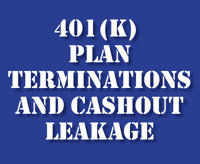 During the COVID-19 crisis, massive job losses combined with economic hardship and relaxed restrictions on withdrawals have created the conditions for a perfect storm of 401(k) cashout leakage. Unfortunately, this storm may soon gain more strength, when a surge in end-of-year 401(k) plan terminations could trigger a new flood of cashouts, as participants are forced to leave their former employers’ plans.
During the COVID-19 crisis, massive job losses combined with economic hardship and relaxed restrictions on withdrawals have created the conditions for a perfect storm of 401(k) cashout leakage. Unfortunately, this storm may soon gain more strength, when a surge in end-of-year 401(k) plan terminations could trigger a new flood of cashouts, as participants are forced to leave their former employers’ plans.
Sponsors of terminating 401(k) plans can take steps to avoid excessive cashout leakage by ensuring that participants receive an enhanced standard of care, including education and consolidation assistance during the plan termination process.
The Linkage to Leakage
401(k) plans are terminated for a variety of reasons, including a merger or acquisition, the consolidation of qualified plans, a bankruptcy or a business closure.
In the case of the COVID-19 pandemic, bankruptcies and business closures will dramatically increase, driving plan terminations. Thousands of small businesses, including restaurants and neighborhood retail stores, have shuttered for good. Businesses of all sizes in entire industries – specifically the automotive, energy, healthcare, retail and travel and tourism sectors – have sustained significant damage. One expert recently predicted that, for 2020 “we will see more bankruptcies than in any businessperson’s lifetime.”
As these businesses close or reorganize, many will be forced to terminate their 401(k) plans.
If performed correctly, these terminating 401(k) plans will follow an established process that includes:
- Planning & preparation
- Announcement & notification
- Location of missing participants
- Distribution of all plan assets
- Final plan termination and filings
But here’s the rub. Given the imperative to distribute all balances, no participant in a terminating 401(k) has the option of leaving their balance in the plan.
When terminated plan participants are given an ultimatum to act, along with minimal education or assistance – far too many make the wrong choice and opt to cash out their retirement savings completely. That’s because cashing out is easy, whereas moving retirement savings forward is hard. A 2015 Boston Research Technologies survey of 5,000 former participants showed that half of the participants who cashed out indicated that they would not have done so if rolling their savings into their new plan was as easy as cashing out.
It doesn’t have to be that way.
An Enhanced Standard of Care for Participants
Research has conclusively demonstrated that, when facing a distribution decision, offering participants education and assistance – including facilitating portability – can reduce cashout leakage by over 50%.
Sponsors of terminating 401(k) plans should ensure that all participants – regardless of their balance – receive an enhanced standard of care that includes:
- Conducting diligent searches for all missing participants
- Helping responsive participants fully understand their distribution options, as well as the high cost of cashing out
- Assisting responsive participants in consolidating their retirement savings, regardless of balance
For unresponsive participants whose 401(k) balances are forced into a safe harbor IRA, sponsors should select a safe harbor IRA provider that:
- Undertakes ongoing efforts to locate missing account holders
- Offers a simple, clearly communicated and reasonable fee structure
- Erects no barriers to exit (ex. – requiring signature guarantees)
- Actively assists former participants in moving their safe harbor IRA balances forward
The Final Act
In this final exercise of their fiduciary responsibility, sponsors of terminating 401(k) plans can dramatically reduce unnecessary cashout leakage and protect the retirement security of their participants by insisting on a standard of care that includes education and assistance.
This final act of caring could help to brighten an otherwise dark chapter for many Americans.
